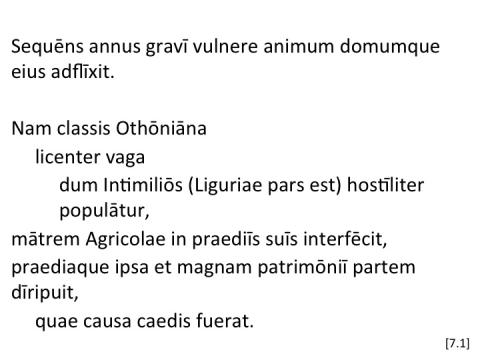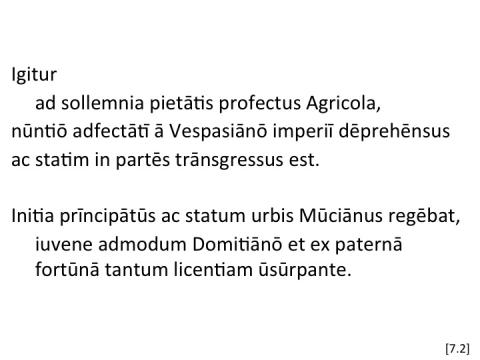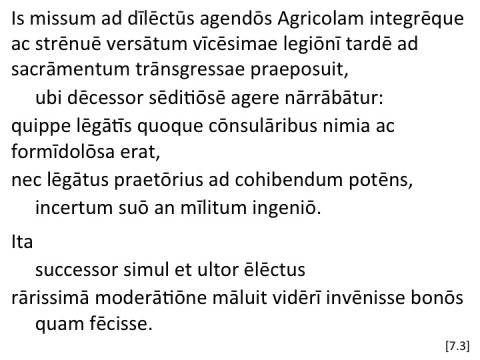Overview: The murder of Agricola's mother; he espouses the cause of Vespasian and is sent to Britain to quell a mutiny. (Stuart)
7.1
sequēns annus: 69 CE, the "year of the four emperors," Galba, Otho, Vitellius, and Vespasian. Note the personification of annus; this is an oft-recurring poetic element in Tacitus's style. (Stuart) annus ... adflīxit: annus is personified, as in ch. 22. (Pearce)
classis Othōniāna: while Otho marched north with his land force against the troops of his rival Vitellius who was holding the passes of the Alps, a naval armament was dispatched to Gallia Narbonensis to turn the flank of the invading army. (Stuart)
Intimiliōs: Vintimiglia. The text is corrupt here. The plural form of the town's ancient name is closer to what is in the manuscript, in templo. Some editors print the more common singular form (see notes below). (Damon) Intimilium: the municipium Albintimilium, now Vintimiglia, on the Riviera. (Stuart); in the Histories 2.13 Tacitus tells us that Otho's soldiers, irritated by an unproductive victory over the mountaineers of the maritime Alps, wreaked their displeasure upon the harmless inhabitants of Intimilium: “But the rapacity of the troops glutted itself in the ruin of an innocent population.” (Pearce); 12 miles east of Monaco. (Gudeman)
hostīliter populātur: only apparently pleonastic, the adverb being added, because it was a Roman fleet devastating Roman territory. (Gudeman)
suīs: instead of eius to emphasize the enormity of the outrage committed by killing a defenseless woman in her own home. (Stuart) in praediīs suīs: suis is not so strictly reflexive as se, but often means "his, her, their own," in reference to some person mentioned prominently in the sentence. (Pearce)
causa caedis: they were intent on plunder and were not actuated by motives of animosity or political expediency. (Stuart)
7.2
sollemnia pietātis: "the customary offices of filial devotion." (Stuart); i.e. the rites prescribed by filial affection to be paid at his mother's tomb. Of course he could not have been present at her burial. As Otho's fleet was dispatched in March, and Vespasian was proclaimed at Alexandria on July 1, some months must have elapsed before he started for Intimilium. (Pearce)
adfectātī: here not in the usual sense, "aimed at," but "seized," a step further. (Pearce) adfectātī ā Vespasiānō imperiī: Vespasian, who at the time was commander in Judaea, was hailed emperor early in July 69 CE by the Egyptian, Judaean, and Syrian legions. (Stuart); "had designs upon the throne," implying, however, that these were on the point of realization. (Gudeman)
dēprehēnsus: “to his surprise was overtaken by.” (Stuart); "was surprised by the news." The verb often implies surprise. (Gudeman)
in partēs: the plural is common in the meaning of "side," "party." (Pearce)
trānsgressus: a regular word for espousing a cause. (Stuart)
Mūciānus regēbat: C. Licinius Mucianus, proconsular governor of Syria, had from the first assumed active leadership of Vespasian's forces, and after the occupation of Rome by Antonius Primus and the Flavian partisans took control of affairs in the City. (Stuart); governor of Syria at the time of Nero's death. He joined Vespasian and occupied Rome in his interest, while Vespasian himself remained in Asia. (Pearce)
iuvene admodum Domitiānō: Domitian is mentioned because he was in Rome at the time and would have been naturally the deputy of his father except for the reasons given. He was eighteen years of age. (Stuart); on his character, see Hist. 4.2.1, “Domitian had entered into possession of the title and residence of Cæsar, but not yet applying himself to business, was playing the part of a son of the throne with debauchery and intrigue,” and Suet. Domit. 1. (Gudeman)
fortūnā: "rank"; especially imperial rank, as here. (Stuart); "imperial rank." So repeatedly used and of Vespasian in particular. See note on ch. 13.3. (Gudeman)
tantum licentiam: i.e. he abused the privileges while neglecting the responsibilities of his position as Vespasian's son. (Pearce)
7.3
ad dīlēctūs agendōs: to repair the losses occasioned by the civil conflicts of 69 CE. (Stuart); in Italy, in 70 CE. (Gudeman)
integrē: “uprightly.” (Stuart); i.e. he was inaccessible to bribery on the part of men who wished to avoid service. (Pearce)
versātum: generally used with a further definition of the sphere of action. Here supply in delectibus agendis. (Pearce)
vīcēsimae legiōnī: called officially Leg. XX Valeria Victrix, had been stationed in Britain since the reign of Claudius, and had become so identified with the service there that Tacitus did not deem it necessary to mention definitely the scene of Agricola's activity until the next chapter. (Stuart); also known as the Valeria Victrix, stationed at Deva, the modern Chester. At the same time, there were in Britain three other legions, the Second Augusta, the Ninth Hispana, and the Fourteenth Gemina Valeria Victrix, replaced by the Second Adiutrix, by 70 CE. They had their headquarters at Caerleon (in Wales), York, and Lincoln, respectively. (Gudeman)
tardē ad sacrāmentum: the XIV Gemina and the II Augusta, Vespasian's former command, declared for him, although the latter legion afterward wavered in its allegiance. The other two legions serving in Britain, the IX Hispana and the XX Victrix, sided with Vitellius. Agricola crossed to Britain for the second time in the year 70 CE. (Stuart)
ubi: i.e. in Britain, as the Roman reader would know. (Stuart); either "in Britain," to be understood from the context, or = apud quam legionem. The former is preferable. (Gudeman)
dēcessor: Agricola's predecessor, M. Roscius Caelius, in the year 69 CE had fomented a revolt against Trebellius Maximus, the unpopular governor of Britain, and had forced him to flee for refuge to Vitellius in Gaul. (Stuart); viz. Roscius Caelius, as we learn from Hist. 1.60, where he is charged by the legate Trebellius Maximus with being responsible for insubordination and incapacity. In the present passage the accusation of treason is mentioned independently, because, unlike the other charge, it lacked substantiation (narrabatur). Tacitus was not over friendly to Trebellius. (Gudeman)
nārrābātur: Tacitus conservatively gives the report of the matter as it came to Rome and does not himself vouch for the truth of the accusation. (Stuart)
quippe = enim. (Stuart)
lēgātīs ... cōnsulāribus: viz. Trebellius and Bolanus. Governors of provinces were generally ex-consuls, commanders of legions, ex-praetors. (Pearce) quoque: lends its force to consularibus, which it normally would follow. (Stuart) cōnsulāribus: in Britain the governors were of consular rank. (Stuart)
nimia: as we say “too much for.” Supply legio. (Stuart)
lēgātus praetōrius: i.e. Coelius. The legatus legionis, to be distinguished from the legatus provinciae previously mentioned, was regularly an ex-praetor. Thus Agricola was sent out after his praetorship to assume command of the Twentieth Legion. Consular legates were older men who had had wider experience. (Stuart)
incertum: a nominative in loose apposition to the sentence. The uncertainty explains why Tacitus speaks of his disaffection as a mere report (narrabatur). (Pearce) incertum ... an: a favorite elliptical phrase in Tacitus. ... It was uncertain whether Roscius Coelius was incapable of maintaining discipline, or whether, owing to the turbulent character of this legion, he was deterred from attempting it. (Gudeman)
ita = itaque, extraordinarily frequent in Tacitus. (Gudeman)
rārissimā moderātiōne: we are not to infer that Agricola compounded with the malcontents. He was a strict disciplinarian, and fecisse shows that he quelled the mutiny. Moderatione simply describes his attitude after insubordination had been crushed. He was willing to let bygones be bygones. (Stuart)
bonōs: “loyal.” Agricola was content with restoring discipline, and screened his troops in his dispatches as far as he could. (Pearce)



